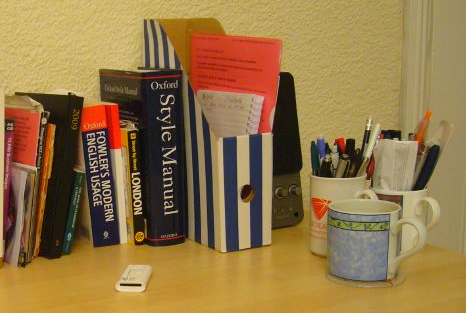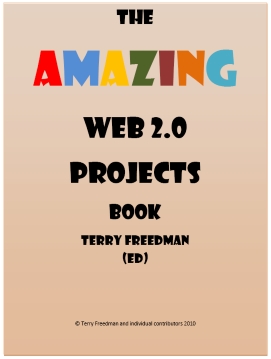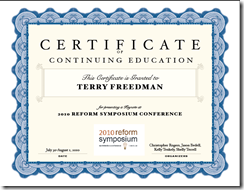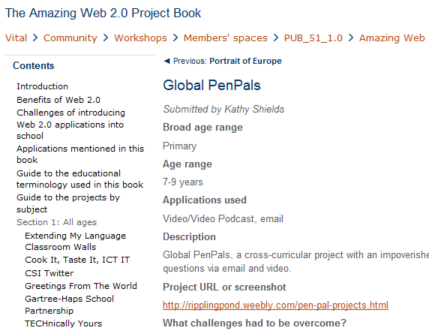If you blog for an audience, as opposed to simply for yourself, what are your obligations? I’d say the following:
 Use manuals to help with tricky or confusing words.
Use manuals to help with tricky or confusing words.
Write with integrity
For example, if you write about a product you have some connection with, especially if your report is positively glowing, then state that connection loud and clear. Unfortunately, the opposite is also true, ie if you don’t have any connection you should probably say so. I use the word ‘unfortunately’ simply because I think it’s a pity that some people think that if you like something, you must be getting a pay-off in some form.
Write accurately
Accuracy is another facet of integrity. Check facts, quotes and references. If you don’t have time to do that, make it clear that you’ve written what you believe to be the case, rather than present it as fact. Some people think that bloggers somehow naturally have more integrity than professional journalists, but I think integrity has to be worked at.
Write incisively
I know that one of the great thing about blogging is that it’s OK to air some half-thought-out idea, which on later reflection or in the light of further information may become regarded as less useful than it first appeared. I think that’s fine, as long you don’t try to sound as if not only do you know what you’re talking about, but that any other viewpoint is plain wrong. Why not just say: “I’ve only just seen this, so my initial thoughts are…”, or “I just had an idea that I haven’t had time to think through, but…” or “Here’s the kernel of an idea; tell me what you think.”?
Writing incisively shows through in the questions you ask as well as what you state. It’s not obligatory to always have an answer.
Write regularly
I think if you have built up a following, even if it’s only a dozen people, you owe it to them to write as regularly as you can. I don’t think you have to write every day necessarily, but reasonably often, like once a week.
(This is something of a counsel of perfection: I have only just managed to update my My Writes blog for the first time in months, because I have been concentrating on the ICT in Education one, which I update pretty much every day).
Write well
I realise that to a large extent good writing is, like beauty, in the eye of the beholder. What you find beautiful I may regard as too florid. Writing which keeps me engaged may leave you in despair at its starkness. That sort of thing is a matter of taste, and there is little if anything to do about that. But surely it is not unreasonable to expect – to take just one example -- that those who blog at least trouble themselves to check the vocabulary they use and not, for example, confuse ‘continual’ with ‘continuous’ or ‘uninterested’ with ‘disinterested’? Books which deal with commonly confused words are easy enough to obtain, after all.
Write for a purpose, with the reader in mind
I think if you write for yourself, you can be completely self-centred about what you write. However, in my opinion, as soon as you have an invited audience (which, by definition, you do have by making your blog URL known), you have an obligation to give them a reason to read your blog, whether that’s entertainment, enlightenment or simply stuff to think about.
Write for all your audiences as well as each of your audiences
We urge pupils to write for an audience, and to write differently for different specific audiences. Should we not also encourage them to develop a set of over-arching principles that would apply to all writing, for all audiences?
Write with consideration
I suppose this is a personal thing, but I don’t like the idea of having swearing, or even implied swearing, on my blog, in case it offends some readers. That’s why I sometimes don’t publish comments expressing an opinion ‘robustly’. People are entitled to their opinion, and they’re entitled to express it forcefully, but if they do so by using expletives I’m afraid it won’t see the light of day here.
Be yourself
As Polonius said in Hamlet, “To thine own self be true.” I think an obligation that each blogger has is to define his or her own set of obligations. That is, I think that if you’re going to write publicly you have to develop a set of rules by which to write by. They may be very different from the ones I’ve listed here, which clearly reflect my own value system, but I think the process of thinking about them is important.
Be silent
Finally, I don’t think it’s necessary, or even wise, or useful, to pass comment on something as soon as it’s been announced. It’s good to be first with the news, but it’s also good to be among the first with well-considered reflections.
As Salvator Rosa said,
Be silent, unless what you have to say is better than silence.
What have I overlooked?
 Back in August 2007 I wrote the following article about Twitter:
Back in August 2007 I wrote the following article about Twitter: 


















